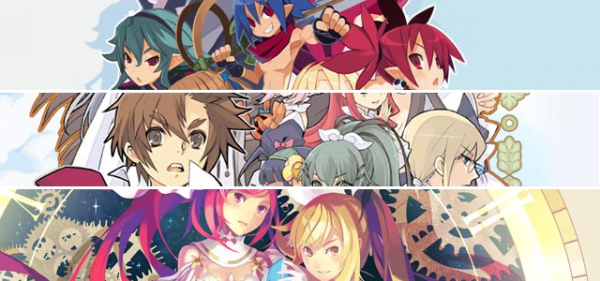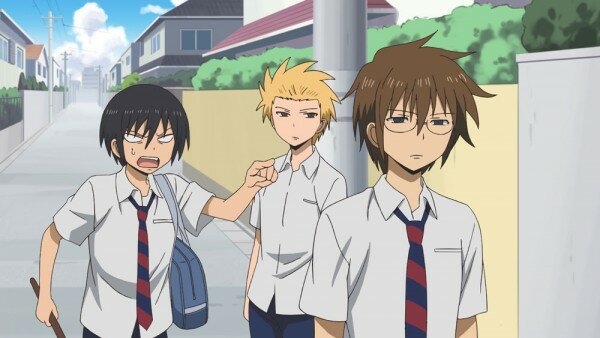
From top to bottom: Disgaea D2: A Brighter Darkness, The Guided Fate Paradox, and Time and Eternity.
NIS America, established on the 24th of December, 2003, acts as the Western publisher for Nippon Ichi Software, having released games not only in North America, but Europe and Australia too. Nippon Ichi Software is best known for their tactical RPG series Disgaea, which features gameplay just as wicked as its sense of humour and has received critical and fanatical acclaim alike.
I am fascinated by this powerful niche publisher so, on a whim, I decided to draw up a long list of long winded questions and send them off to NIS America’s HQ. Chris King and David Alonzo, NIS America marketing coordinators, were kind enough to answer some of them for me with the help of their editor, Steven Carlton.
Looking through the list of NIS America releases, it’s clear that European countries—and even Australia!—are receiving more and more releases, how important (in terms of sales and exposure) are they when compared to North America?
“It is very important to us. Being able to provide niche titles to fans of the specific genre in various regions is our ultimate goal. We’re hoping that our fans in Europe and Australia are enjoying the games we’re publishing, as we love bringing them over.”
Do you think it might be beneficial for there to be an NIS Europe at some stage in the future, or can the present level of demand be easily met by NIS America?
“We actually had an NIS Europe for a short period of time, but business wise, it just made more sense to fold it in with NIS America and we feel that our current method of operation is working nice and dandy for us.”
NIS America publishes not only Nippon Ichi Software developed videogames, but a wide range of niche Japanese titles that would otherwise likely not see the light of day in the West. What is the philosophy behind NIS America acting as a broader publisher? And, if you will permit me to dilute the question, do you think that publishing games by other developers might take away from the sales potential of NIS developed games and potentially over-saturate a niche market? Or does publishing more games within the niche actually help NIS developed games sell by growing the market?
“We undoubtedly have our core audience and our style of niche games, but at the same time, are always open to new opportunities that fit with our core philosophy. We simply want to see awesome titles see light outside of Japan. Publishing more games within the niche is a good thing. We want the market to grow, and want fans of the genre to be satisfied.”
Is it NIS America’s job to decide which games to localise and publish in the West, and if so, what is the criteria that a game must fulfil to be considered for publication; and then to be published? Is there a difference in the decision process for localisation approval for NIS developed titles and third party titles?
“When it comes to choosing which titles we localize, the decision making process can be simple, or complex. It is a case-by-case situation. We do our best to bring all NIS developed titles to the West, which is more of an obvious kind of decision, naturally. 3rd party titles require more analysis. Does this game match our vision as a company? Will our existing fan-base enjoy this title? Does the game kick butt?”
Now that we know how the process works, who exactly is involved in it? Seedy businessmen in a conference room sucking on cigars and sipping whiskeys? (Not that that’s a bad thing!)
“It’s a combination of the wisdom, genius, experience, and “gut-feeling” from our wonderful NISA staff *puts out cigar on ashtray*”
Given that most games that NIS America publishes are released into a niche market, does NIS America seek out games fitting that niche best, or look for games that might have a broader appeal and may be able to break out of that niche?
“We understand that we have an awesome niche fan-base, and are always thinking of them during our decision making process. On the same hand, we are open to new titles and new directions, and always listen to our fans when it comes to game suggestions.”
Do you internally localise all the games you publish in the West, or do you commission third parties to localise some, if not all of them?
“It is all taken care of internally by our localization team.”
In the process of localisation, how much focus is put on making the game understandable to a Western audience, and how much is placed on preserving the potentially culturally-esoteric content of the game being localised?
“Our talented localization team are masters at taking pop culture humour from Japan, and reshaping it to fit into a Western audience.”
In Hyperdimension Neptunia Mk. 2, there was a lot of sexual content that could have been interpreted as being offensive in the West, and the series has indeed received its fair share of negative press for featuring such content. Is it a big risk including such content in the localisation? Or do the benefits of including it (making it more appealing to the niche market it is aimed at) outweigh the dangers? Personally, I think you deserve a lot of credit for including such content!
“We aim to please our fans, however we always discuss potentially inappropriate material beforehand.”
With mainstream JRPGs receiving a substantial amount of negative press, do you think that it has benefitted NIS to have their own publishing company located in the West, in the sense that it may provide extra insight into what is commercially viable in the West, whereas Japanese developers that publish with an external company may not receive the same level of insight and input from their publisher?
“It depends on the company. For NISJ titles that we publish to the Western and European market, we gladly share that information to provide the inside to our home base. We do the same when it comes to publishing titles that aren’t from our home company, such as from developers like Idea Factory.”
And more broadly speaking, has the negative press that mainstream JRPGs have received recently affected the marketing potential of the more niche JRPGs that NIS America publishes, or do both markets effectively operate separately?
“Our titles appeal to a certain group of JRPG lovers, but not necessarily to all JRPG fans. Gamers approach our stuff with a different set of expectations than major blockbuster JRPGs, so we’re not as affected by the negative press that mainstream games might be receiving. Still, those games are often an entry into the more niche titles we specialize in, so there is still a connection there.”
Perhaps more niche JRPGs have actually benefitted from the negative press? Certainly, given the more complex combat systems of many games published by NIS America when compared to mainstream JRPGs, it appears that the waning of mainstream JRPGs gives them an effective point of marketing?
“I think we’ve established ourselves as a company that isn’t afraid to publish quirky, self-referential JRPGs, and that’s what allows our titles to stand out amongst other JRPGs. Some gamers who have grown used to JRPG standards will be drawn to our games because they sidestep conventions while still paying homage to what people expect from JRPGs.”
Considering that you sit somewhere between a mainstream publisher (more marketing power) and an indie one (underdog sympathy from the press), do you have to work especially hard to get coverage? GameSpot responded to requests asking why they would not be reviewing Hyperdimension Neptunia Victory, and their statement read as being very dismissive. I am sure you do not want to speak on any specific website or incident (and, for the record, it reflects worse on GameSpot than Hyperdimension Neptunia Victory), but this incident does seem to indicate that because they had to make a public statement regarding their decision not to review Hyperdimension Neptunia Victory that there might be more demand for coverage of NIS America published games than the mainstream press is willing to give.
“Although we might not get coverage from some mainstream sites, we do receive a good amount of coverage from many smaller sites. All the same, we’re constantly trying to expand our presence in the gaming world, and we do this the old-fashioned way of attending conventions and establishing face-to-face relationships with the press. It helps a ton that we have such a vocal fanbase!”
For that matter, how important is press coverage? A lot of NIS America published games have received a mediocre response from critics, but have been received very positively by fans. Victory is a perfect example of this, receiving a Metascore of 54, but a User Score of 8.1 [at the time of publishing] on MetaCritic. Can a mediocre or poor critical response damage a game’s marketability more than if it were to be less critically promoted, considering that a lot of NIS America published titles are likely to receive a lukewarm response from the mainstream gaming press? Or, because it is a niche market, is the importance of a Metascore lessened? Unlike with mainstream games where a high Metascore is important enough to put on one’s résumé.
“Because we don’t have a huge budget to market our games, press coverage is quite important in reaching new fans. At the same time, we want people who are familiar with the culture of JRPGs to review our titles. Having that understanding of where these games are coming from allows for a fuller appreciation of them, so we take that into account when reading reviews that might not be favorable. Still, we’re always looking forward to receiving a good Metascore because at the end of the day, a good score will catch more people’s interest than anything else.”
If I may bring up the Hyperdimension Neptunia series again, I thought Mk2 was an incredibly clever, subversive game with an exceptional battle system. It was released at a time when JRPGs were being criticised for a lack of creativity and a reliance on antiquated battle systems; and yet most reviews focused the majority of their gameplay analysis on criticising the repetitive elements present in the game’s structure. Here was a JRPG with an original, innovative battle system that received little praise for doing what many critics seemed to be crying out for! Is it frustrating attempting to gain coverage for a game; only to have that coverage seem to misinterpret it completely?
“Unfortunately, there’s really no way to control how people react to something. We definitely appreciate when anyone takes the time to review our titles, but not everyone will love what you love. Where would the fun be if everyone agreed with you on everything, anyway?”
For that matter, is it difficult trying to get mainstream publications that seem very willing to stereotype a genre based on a few big series to understand what the game you’re promoting is all about?
“For the most part, reviewers that might not have knowledge about the culture behind our games still keep an open mind about the games and can look at the gameplay objectively. Any reviewer that plays a game simply to reinforce their prejudices would be doing a disservice to readers.”
In recent times there’s been a lot of criticism of the Japanese videogame industry, both internally and externally. Japanese publishers appear to be attempting to establish themselves as Western forces through publishing Western games as if they do not have confidence in their own Japanese developed games. In the case of Square-Enix this doesn’t seem to be working, with them publically admitting their disappointment in the sales of Tomb Raider as well as other Western developed games they published. Do you think there is potential for Japanese publishers to publish Western games successfully, or, for the moment, do they simply not understand the Western market well enough due to the huge disparity in taste between the East and the West?
“Maybe Japanese companies could start testing the waters by publishing more Western games. Surprisingly, it seems like first-person shooters are starting to gain some traction in Japan, so there is a potential growing market for such games.”
In some ways it does seem that big budget Japanese development philosophies (creating a unique engine for each game; a big focus on a high level of artistic, technical and visual polish; etc.) are not entirely compatible with the cost of developing triple A videogames today—but being directly involved in the Japanese videogame industry (albeit as a Western publisher), do you think that this is a genuine concern amongst the majority of Japanese developers? And does it affect mid-sized developers such as Nippon Ichi Software, and smaller ones as well?
“It seems like the big budget model would fit perfectly for developing a triple-A title because the companies that have the resources to make such games can do so. Smaller companies with smaller budgets such as ours must get by simply on our wit and charm.”
If there is a genuine concern amongst most Japanese developers—developers of all sizes—then how do you think the Japanese videogame industry might be able to adapt to the high costs involved in modern videogame development?
“It’s really a matter of doing more with less. How to go about doing that really depends on each company, but I don’t think I can say much more than that.”
How is the quantity of promotional copies of each game being promoted decided? Is it simply based on overall marketing budget as a general rule, or is it done on a case by case basis? For example: on one title you might put more money into advertising directly to the consumer, than promoting the game indirectly through third party reviews and previews.
“We usually have a specific marketing strategy for each title we publish, and distribute promo copies accordingly.”
Do review copies (both digital and physical) generally have the same monetary value as the commercial version of the game, in the sense that you must pay the distributor for each review copy that you release to the press?
“We pay the same amount for both review and retail copies of games.”
Now onto the anime! I’ve asked many questions already, so I’ll try to be brief. My apologies for being so verbose thus far!
I recently finished Shin Megami Tensei: Devil Summoner: Raidou Kuzonoha vs. The Soulless Army, and the battle system featured several similar concepts to those used in Final Fantasy XII; a game that was widely praised at the time in the West for its apparently innovative, and never before seen in JRPGs battle system—Raidou Kuzonoha having been released two weeks before FFXII in Japan. It seems as if you’re fighting against stereotyping, and just plain ignorance, but I suppose that is to be expected when bringing something from one culture to another. With that in mind, is this a problem faced by your anime publications, or is the Western anime market a lot broader in scope? If so, does this make your job easier than it is when localising videogames?
“From personal conversations I’ve had, it seems like anime is a much more diffuse medium than video games. By that, I mean there’s such a variety of genres within anime that there’s no one “right” way to do anime, whereas expectations for videogames are a bit more entrenched. So yes, anime encompasses a lot more. People are also more familiar with Japanese culture in anime (obviously), but they may not have the same understanding when it comes to games.”
Obviously NIS America’s third party videogame publishing strategy attempts to fill the JRPG niche outside of mainstream titles; what is your anime publishing hook? Looking through some of your published series, you seem to cover a broader range of styles than you do in videogames.
“We’re relatively new to the world of anime publishing and so we like the challenge of bringing new and different anime titles to the West. In that respect, we approach anime the same way we do games, with a focus on titles that are a little outside the box.”
With the above in mind, what is the process involved in choosing what anime to publish, or do local distributors commission you to publish their series in the West?
“We choose the anime titles on our own, rather than publishing based off of commission.”
Do you also internally localise the series you publish? If so, are the same philosophies and machinations behind the localisation process of videogames used in your anime localisation?
“Our localization process is the same as with our games. Each title gets a translator and an editor who work together to maintain the spirit and meaning of the original Japanese audio.”
Thank you very much for your time, Chris (and co.); I know it was a lengthy interview, but I hope you all enjoyed the questions. Good luck with future publications!
“My pleasure, dood! I hope we can do another one soon!”



